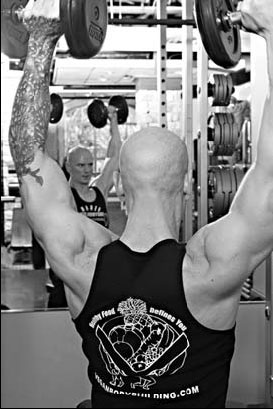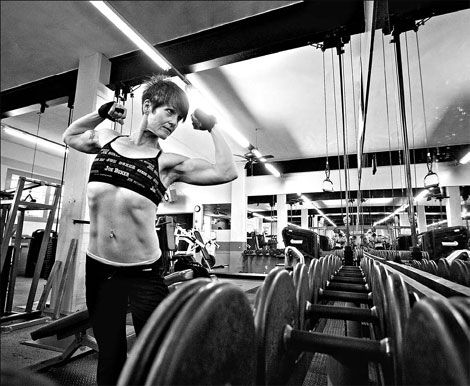Sculpturing muscle, yet strictly vegan
Updated: 2012-02-19 08:36
By Mary Pilon(The New York Times)
|
|||||||
|
Some bodybuilders have incorporated a plant-based diet into their regimen, including Lisa Koehn. Jimi Sitko, right, has become a vegan. Baron Sekiya for The New York Times; below, Robert Rausch for The New York Times |
HUNTSVILLE, Alabama - Jimi Sitko's apartment is filled with medals and trophies from bodybuilding competitions, and snapshots of his tanned, rippled physique in full flex.
But most surprising is what is inside Mr. Sitko's stomach: tofu, fresh greens and plant-based protein powder.
Bodybuilders have long been known for maintaining highly restrictive diets, often low in carbohydrates and high in protein and calories. They aim to have big muscles and little fat, which may require cycles of adding weight, then chiseling away fat to make muscles pop. Mr. Sitko is among a niche community of vegan bodybuilders who are forging a distinctive subculture and hope to change competitors' eating habits.
As a vegan, Mr. Sitko, 29, does not eat meat, dairy or, he said, "anything else that comes from an animal." As a bodybuilder, he spends hours at the gym lifting barbells, running on a treadmill and sculpturing his 1.8-meter, 81.6-kilogram body.
He is preparing for a competition in March.
There is little data on competitive bodybuilders who are vegan, though the Web site veganbodybuilding.com has more than 5,000 registered users.
For some vegan bodybuilders, like Mr. Sitko, veganism was an attempt to improve diet and health. Others said that a vegan lifestyle reflected their personal beliefs about animal or environmental preservation. Still others regarded it as a form of rebellion against steroid culture.
Nutritionists' positions vary.

"Is it possible to be a good bodybuilder and be a vegan? Yes," said Jose Antonio, the chief executive of the International Society of Sports Nutrition. "But is it ideal? No."
Vegan bodybuilders may face challenges getting sufficient amino acids, found in meats, Mr. Antonio said, adding that although protein can be found in vegetables and nuts, they must be consumed in greater quantities to get the same amount as their counterparts in meat.
"The amount of rice and beans you need to eat would fill up a Mexican restaurant," he said.
Other nutritionists have argued that a disciplined vegan diet, consisting of things like hemp-based protein supplements, peanut butter, nuts, vegetables and legumes, can yield similar, if not better, results than a meat- or dairy-filled diet. Carefully monitored, vegans can get the same amount of protein with less fat or toxins, they argue. (For a midafternoon snack, Mr. Sitko sometimes eats 10 bananas.)
Kenneth G. Williams, a 44-year-old bodybuilder in Oakland, California, is a vegan who has taken on traditional bodybuilders and won. But first, there was the stigma.
"I had buddies at the gym, they just thought I was crazy," Mr. Williams said. In 2003, he became vegan. In 2004, he won his first competition. "But once the announcer mentioned I was a vegan, the claps stopped and it got so quiet in that auditorium," he said. "Right onstage, it hit me: nobody knows about this."
Mr. Williams is now a raw vegan; he said he never heated his food above 44.4 degrees Celsius.
"I'm a warrior now," he said. "The athletes are just out to get paid. Warriors stand for something."
The New York Times
(China Daily 02/19/2012 page10)
